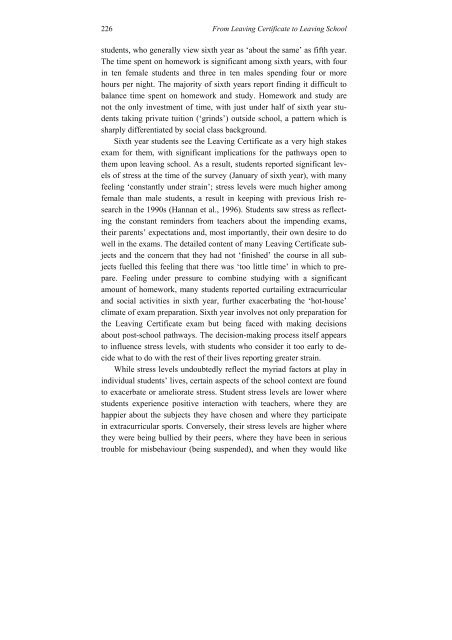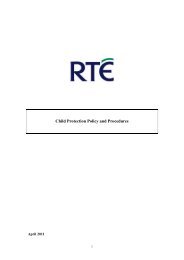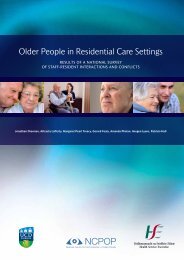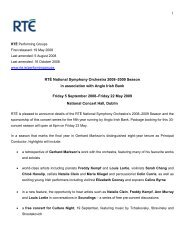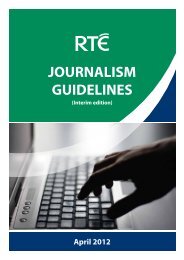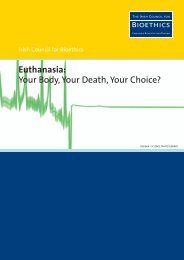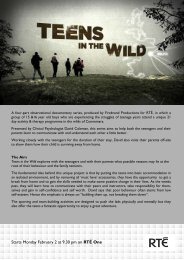From Leaving CertiFiCate to Leaving SChooL a Longitudinal Study ...
From Leaving CertiFiCate to Leaving SChooL a Longitudinal Study ...
From Leaving CertiFiCate to Leaving SChooL a Longitudinal Study ...
You also want an ePaper? Increase the reach of your titles
YUMPU automatically turns print PDFs into web optimized ePapers that Google loves.
226<br />
<strong>From</strong> <strong>Leaving</strong> Certificate <strong>to</strong> <strong>Leaving</strong> School<br />
students, who generally view sixth year as ‘about the same’ as fifth year.<br />
The time spent on homework is significant among sixth years, with four<br />
in ten female students and three in ten males spending four or more<br />
hours per night. The majority of sixth years report finding it difficult <strong>to</strong><br />
balance time spent on homework and study. Homework and study are<br />
not the only investment of time, with just under half of sixth year students<br />
taking private tuition (‘grinds’) outside school, a pattern which is<br />
sharply differentiated by social class background.<br />
Sixth year students see the <strong>Leaving</strong> Certificate as a very high stakes<br />
exam for them, with significant implications for the pathways open <strong>to</strong><br />
them upon leaving school. As a result, students reported significant levels<br />
of stress at the time of the survey (January of sixth year), with many<br />
feeling ‘constantly under strain’; stress levels were much higher among<br />
female than male students, a result in keeping with previous Irish research<br />
in the 1990s (Hannan et al., 1996). Students saw stress as reflecting<br />
the constant reminders from teachers about the impending exams,<br />
their parents’ expectations and, most importantly, their own desire <strong>to</strong> do<br />
well in the exams. The detailed content of many <strong>Leaving</strong> Certificate subjects<br />
and the concern that they had not ‘finished’ the course in all subjects<br />
fuelled this feeling that there was ‘<strong>to</strong>o little time’ in which <strong>to</strong> prepare.<br />
Feeling under pressure <strong>to</strong> combine studying with a significant<br />
amount of homework, many students reported curtailing extracurricular<br />
and social activities in sixth year, further exacerbating the ‘hot-house’<br />
climate of exam preparation. Sixth year involves not only preparation for<br />
the <strong>Leaving</strong> Certificate exam but being faced with making decisions<br />
about post-school pathways. The decision-making process itself appears<br />
<strong>to</strong> influence stress levels, with students who consider it <strong>to</strong>o early <strong>to</strong> decide<br />
what <strong>to</strong> do with the rest of their lives reporting greater strain.<br />
While stress levels undoubtedly reflect the myriad fac<strong>to</strong>rs at play in<br />
individual students’ lives, certain aspects of the school context are found<br />
<strong>to</strong> exacerbate or ameliorate stress. Student stress levels are lower where<br />
students experience positive interaction with teachers, where they are<br />
happier about the subjects they have chosen and where they participate<br />
in extracurricular sports. Conversely, their stress levels are higher where<br />
they were being bullied by their peers, where they have been in serious<br />
trouble for misbehaviour (being suspended), and when they would like


